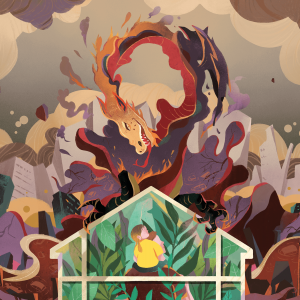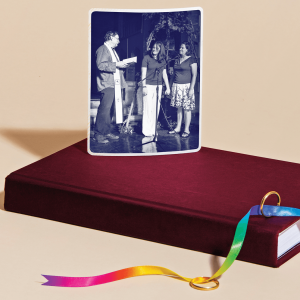
Lydia Wylie-Kellermann is editor of Geez magazine and The Sandbox Revolution: Raising Kids for a Just World (Broadleaf, 2021). She lives in Detroit.
Posts By This Author
Raising Children for Joy in the Face of Climate Catastrophe
“MOMMY, WHY DON'T people care about the trees?”
I lay on the floor feeling the weight in my chest. I can hear a constellation of starlings gathering in the silver maple out my window. Every breath takes work to keep the airways open against the anxiety that has grasped my body. My youngest’s question was haunting me.
How on earth are we supposed to parent in this moment? Climate catastrophe is upon us. We will know its touch, if we haven’t already, and our children will certainly know it. How do we keep grounded as we move from one crisis to the next?
I reach for a cassette labeled “Jeanie Wylie-Kellermann workshop, 1991.” I blow off the dust and stick it in the tape player. Out comes a voice that was once as common as daily bread: my mother’s voice. Sixteen years after her death, I hear her, clear and steady.
She reads Revelation 12: “A woman clothed with the sun, with the moon under her feet, with 12 stars on her head for a crown. She was pregnant and in labor, crying out in pain as she was about to give birth.” I listen as my belly, still etched with the stretch marks from when my own body groaned with creation, rises off the floor. “The dragon stood before the woman about to deliver, to devour her child the moment she gave birth.”
I keep breathing; yes, I know this old dragon. And I cry out with this woman and hunger for her company.
What Do You Do When Sacred Vows Defy Church Doctrine?
IN AUGUST, LEADERS of the United Methodist Church from around the world are scheduled to meet, in Minneapolis and/or online. The denomination’s future will be on the table as delegates address the decades-old debate about full inclusion of LGBTQI members, including in same-sex marriage and ordination. Meanwhile, congregations around the U.S. and elsewhere have taken various approaches to the pastoral realities of their members. Lydia Wylie Kellermann and her father, retired Methodist pastor Bill Wylie-Kellermann, explain what it meant to support each other through Lydia’s wedding and the ecclesial reverberations that followed. Editor's note: After this issue went to print, the UMC postponed the 2021 General Conference until 2022.
Lydia Wylie-Kellermann: This is a story about risk and fear. It is a story about love. And it’s about the moments when standing beside the ones you love becomes an act of justice. It is the kind of story that begs us to ask what it means to be church. It is an ordinary story turned holy by the common occurrence of the very personal moments of our lives interacting with structural injustice and the way resistance and love unfold.
Ten years ago, I married Erinn. It was in a political moment when gay marriage was illegal and most denominations were still forbidding it.
Yet we were clear that we were not merely roommates or partners, but that marriage was a vocation we were summoned to together. We had no doubt that our relationship was blessed by community and by God. We wanted to promise our lives to one another and publicly offer our marriage as a gift back upon community.
It was a moment of total clarity for me, yet it was also really scary. We had to climb the steps of the church fearing we would pass through a line of protesters. We entered the sanctuary feeling the loved ones missing in the pews because they couldn’t support our marriage. We walked hand in hand down the aisle, combatting our own internalized homophobia, showing our love publicly with hands, promises, and kisses.
We could not have done it without the love of community. The dearly beloveds who filled that church held our hearts and knees steady.
One of those people that stood beside us and laid his hands upon us was my dad. He loved us, celebrated us, and summoned God to move in and through the day and into the rest of our lives. He co-officiated our service. As an ordained Methodist pastor serving a spunky, activist Episcopal church, he was risking losing his orders and losing his job.
Bill Wylie-Kellermann: Those were real fears. For as long as I can remember, I had said to myself that if a member of my congregation asked me to preside at a same-sex wedding, one discerned in pastoral care, that I would certainly do it. I was navigating a contradiction in the United Methodist Book of Discipline that enjoined me to offer pastoral ministry to all members in my care but a couple of paragraphs later forbade me to offer sacramental care to particular parishioners. This marriage was essentially pastoral work, but one that functioned as a public action of civil and ecclesial disobedience. I took comfort in Jesus’ ministry, where a personal act of healing would publicly violate Levitical laws of purity, say, putting him in trouble.
5 Ways to Teach Kids About Justice

CristinaMuraca / Shutterstock
READERS OFTEN ASK US: How can I incorporate a hunger for justice into my child’s spiritual formation? How do we help the youngest members of the church understand the gospel’s call to love God and to love our neighbors as ourselves? Sojourners asked five Christian parents engaged in various forms of justice work to share their best tips for helping children put their faith into action. Here’s what they said. - The Editors
1. Look for Teachable Moments
by Kate Ott
MANY PARENTS FEEL unprepared to talk about sex or faith with their children. I was one of those parents until I realized age-appropriate sexuality information could empower my children and keep them safe. I also realized that teaching my kids about sexuality meant more than talking about “sex.” After all, if I didn’t talk to my kids about how Christian values of love, justice, and mutuality guide the care of our bodies and our relationship choices, who would?
So rather than planning for a single “big talk” or waiting until I know all the answers, I practice parenting through teachable moments. For example, in our house we talk about how clothing choices and hygiene reflect our thankfulness for our bodies as part of God’s good creation (including remembering to brush teeth!). As a parent, when I take a picture of my kids, I ask them for permission before posting it on social media; this encourages thinking-before-posting and consent as an active yes. And when we’re watching TV or listening to a song in the car about attraction or a relationship, I ask questions like: How would you feel in that situation? Do you think that person values their body? Does that seem like a mutual decision/relationship? Is that kind of love balancing God, neighbor, and self? In the short conversation, I always say something like, “Being in a relationship takes a lot of work and requires communication, honesty, commitment, and mutuality.” This models how to use one’s values to assess relationship choices.

